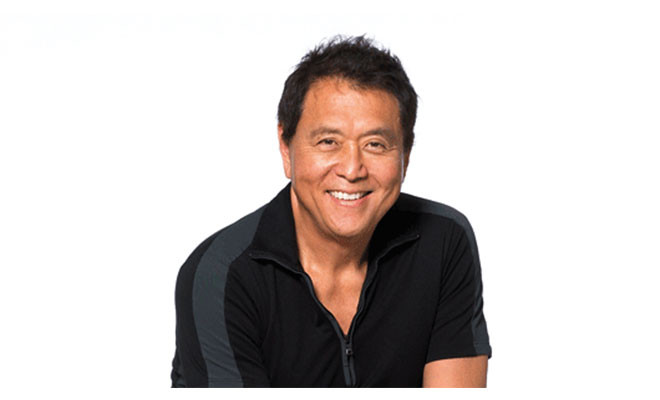
Interview with Robert Kiyosaki
Whatever critics might say about Robert Kiyosaki’s new book — MIDAS TOUCH — one thing is for sure: Many, many people will buy it.
He has built a strong fanbase for his Rich Dad Poor Dad empire, which touts financial education as the key to success. His best-selling book series has been translated into 60 languages, with more than 25 million copies sold. For Midas Touch, he has teamed for a second time with another New York Times-bestselling author, Donald Trump.
Kiyosaki is often criticized for being more of an expert in marketing than finance. As one writer in Slate phrased it: “The apparently charming Kiyosaki seems to be his own best sales weapon” and “a good chunk of what’s actually in the book is self-help boilerplate.” In a Wall Street Journal review of Kiyosaki and Trump’s last book, Why We Want You To Be Rich, the writer referred to Kiyosaki’s “scorn for mutual funds” as “puzzling” and calls the book “short on specific advice.” A hard-hitting investigation by a Canadian television station found investors who felt they’d been duped into paying big bucks for seminars that offered nothing but sales pitches for more expensive seminars.
When I spoke to Kiyosaki last week, I found him passionate, patient and, yes, charming. We talked about his new book, the opportunities for entrepreneurs today and some of the criticism he has faced. Here’s what he said:
1. Why team with Donald Trump for Midas Touch?
He is an entrepreneur — probably one of the most famous and influential entrepreneurs today. I met him in 2004 and we have always shared the same concerns the middle class is getting crushed.
2. Why do you think it is a good time to become an entrepreneur?
It’s always a good time to get into business. Entrepreneurs take advantage of cycles. Now we’re in the information age the reason so many people are losing their jobs is because technology is making them obsolete. we can use the same technology to access world markets and hire fewer people. It’s so much easier than when I started in the 70s. We would go through airports with pockets full of quarters to use a pay-phone and now I just use my cell phone. has reduced the cost of doing business tremendously.
3. Should some people stick to day jobs, and focus on moving up the corporate ladder?
don’t have the internal fortitude to be an entrepreneur. It’s really not for everybody technically everybody can be an entrepreneur. If you’re working for a good company and you’re happy there, and you’re being compensated accordingly, and your work satisfies you, you should stay there. But a lot of people are working at businesses and they know the ax is going to fall and that doesn’t make any sense to me. I worked for Xerox for 4 years and after that I knew I was never going to be a corporate person. It wasn’t my environment.
4. Where would you be today, do you think, if you had stayed at Xerox?
I shudder to think. That’s a horrible question! It was one of the hardest decision I made to leave the compensation, benefits. It was a good company — but it wasn’t for me.
5. What would you do if you lost everything today?
If I lost my job, I’d get a job at McDonald’s. It has the best business systems all over the world. I’d learn every system that McDonald’s has, and then I’d ask to be put in charge of a store. I’d bring the profits up, and then ask if I could manage two stores. When I had 3 stores under my belt, I’d go to an owner and say I will improve operations but I want part of the profit.
6. What causes many businessmen and women to fail?
All Donald and I do all day is raise capital. And the average person coming out of school doesn’t have that skill. You also have to be able to handle people and pressure. When I started my last business, I didn’t receive a paycheck for 13 months. The average person can’t handle that pressure.
7. You’ve recommended financial education above academic education. Why?
It depends upon the person. I say ask what you are going to become at the end of the process. Most people go to school to get a job. If that’s what you want, you don’t need a financial education. If you want to be an entrepreneur, you do. this guy Bernanke is a finance professor. Obama doesn’t have financial experience. This guy Geithner….they’re just bureaucrats. We have people making decisions who aren’t business people.
8. So you would support Trump for a presidential run?
100 percent. He is a businessman. I’ve spent years with him. He tells it like it is. I just want somebody to be straight right now. He doesn’t BS. You don’t have to read through the tea leaves. I would support him but I’m concerned about him…it’s a nasty job. What we have to do to save this economy would not be popular. We have too many people on the government lunch-wagon.
9. The Wall Street Journal criticized your last book with Mr. Trump for slamming mutual funds. How do you respond to that?
Mutual funds are the biggest rip off, after the 401(k). All we said was the middle class will disappear and the Wall Street Journal said we didn’t know what we were talking about. If you look at mutual funds in the last 6 months you’ll find out that we were correct. I say things because I need Wall Street’s money.







